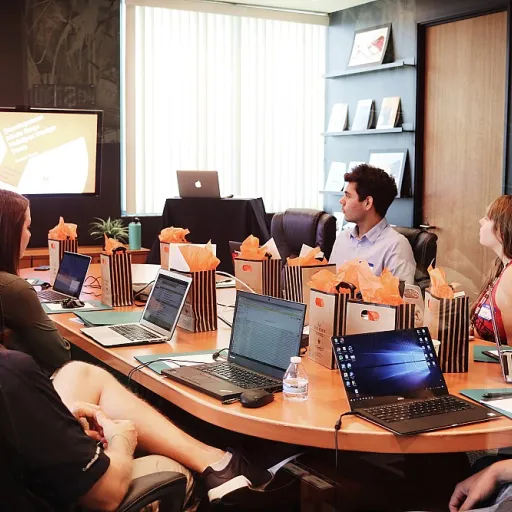
Defining a Screening Interview
What Exactly is a Screening Interview?
A screening interview often stands as the initial step in a company's hiring process. Its primary function is to determine which candidates possess the key qualifications required for the job, acting as a filter to sift through the multitude of applications received. These interviews help in identifying the best candidates early, saving both time and resources down the line.The Role of Screening Interviews in Hiring
During a screening interview, companies assess basic elements such as the candidate's experience, skills, and potential cultural fit. This stage may also be utilized to discuss salary expectations and ensure alignment with the company's defined salary range. Interviewers focus on job-specific questions that help ascertain if an individual will fit into the company's management style and overall culture.Key Elements of the Screening Interview
- Interview Questions: Typically focus on the candidate’s qualifications, role-related skills, and personality traits that align with the company culture.
- Interview Duration: Generally short in nature, ranging around 20-30 minutes, or even shorter for video screening interviews.
- Outcome: Acts as a gatekeeper to proceed to further, more in-depth interviews.
Types of Screening Interviews
Screening interviews can occur over the phone or via video calls, and each type has its unique advantages and drawbacks. Video screening, for instance, provides a more personable interaction compared to phone interviews, which can assist in gauging the candidate's enthusiasm and demeanor directly. When implemented effectively, screening interviews streamline hiring by quickly identifying qualified candidates, reducing the risk of unfit hires at later stages. It ultimately contributes significantly to the success of talent acquisition in a company. Enhancing HR Systems can further optimize this process by integrating technology seamlessly into the workflow.The Screening Interview Process
The Initial Step in the Hiring Journey
In the grand scheme of the hiring process, the screening interview serves as the initial step to filter candidates. It plays a crucial role in identifying those individuals who possess the essential skills and qualifications needed for a specific job position. By conducting screening interviews, companies aim to save time and resources by narrowing down the pool of applicants to the best candidates who might be a good fit for the company and its culture.
How the Screening Interview Process Works
The screening interview typically begins with a preliminary conversation over the phone or via video. This session normally lasts between 15 to 30 minutes, providing a snapshot of the candidate's background, experience, and expectations. It includes discussing key attributes such as personality traits, management style, and cultural fit. Interviewers often ask targeted interview questions that help them gauge whether the candidate aligns with the hiring needs of the company.
Tools and Techniques for Streamlining
To streamline hiring effectively, companies may implement video screening or pre-screening techniques during this phase. These methods offer the flexibility to connect with candidates who may be geographically dispersed, facilitating quick decisions on their potential role within the company. Automated tools and systems like applicant tracking systems can assist in managing digital records of candidates, ensuring that only qualified candidates proceed to in-person interviews, thus optimizing the interview screening process.
Establishing the Next Steps
For candidates who successfully make it through this stage, the screening interview sets the tone for subsequent steps, determining the salary range discussions and giving candidates insights into the potential role they might assume. This ensures a streamlined approach to talent acquisition, setting the ground for further, more detailed interviews.
Screening Interviews and Human Resources Information Systems (HRIS)
Intersection of Screening Interviews and HRIS
In today's digital age, human resources information systems (HRIS) play a pivotal role in streamlining the hiring process, including video screening and pre-screening stages. These systems help companies efficiently manage candidate information, making the flow from initial application to the screening interview much smoother. HRIS can track and record all the details of an interview screening, from date and time to interviewer notes and candidate responses. This functionality is invaluable for maintaining a structured interview process and ensuring that all candidates are evaluated fairly, based on the same set of criteria. One of the significant advantages of integrating HRIS in the screening interviews is the ability to manage large volumes of applicants. With automation, these systems can pre-screen applications based on specific criteria such as job experience, skills, or fit with company culture. This ensures only the most suitable and qualified candidates proceed to the next stage, saving time and resources. Moreover, some HRIS platforms are equipped with tools to help design interview questions tailored to assess personality traits, management style compatibility, and cultural fit within the company. Such insights not only aid in identifying the best candidates for the role but also in aligning expectations regarding salary range and job responsibilities. The HRIS also supports talent acquisition by maintaining a comprehensive database of past applicants. This feature can be crucial in sourcing potential candidates who might fit future roles, especially in a company looking to nurture long-term talent relationships. For companies aiming to enhance their employee engagement through these better hiring practices, investing in a robust HRIS can be greatly beneficial. More insights on maximizing talent acquisition can be found in our article on enhancing employee engagement with a mid-year check-in.Benefits of Conducting Screening Interviews
The Impact of Screening Interviews on the Hiring Process
Conducting screening interviews brings a multitude of benefits to the hiring process. At the initial phase, they help streamline the hiring by narrowing down the pool to the best candidates. By focusing on key job requirements and the role specifics, companies can identify qualified candidates whose skills and experiences align closely with the position. Additionally, screening interviews, whether conducted through video or telephone, save time and resources. These pre-screening methods allow HR professionals to assess candidate fit and swiftly move forward with promising individuals. Such efficiency is invaluable in today's competitive talent acquisition landscape. Screening interviews also play a critical role in assessing cultural fit, enabling companies to gauge whether a candidate’s personality traits and management style are in harmony with company culture. As a result, hires that match both the job requirements and culture can improve employee retention rates. Moreover, these initial interviews offer a preliminary opportunity to discuss salary expectations, ensuring alignment with the company's salary range and reducing potential misalignment issues later in the process. By asking targeted interview questions, recruiters benefit from a more focused and effective interview screening, which enhances decision-making in subsequent stages. In essence, screening interviews are integral in ensuring the hiring process is both comprehensive and efficient, fostering the identification and recruitment of truly qualified candidates.Challenges in Screening Interviews
Facing the Difficulties in Interview Screening
Conducting screening interviews holds its own set of challenges, making it critical to navigate them effectively. One of the main obstacles is the volume of candidates a company must handle at the start of the hiring process. This can lead to time constraints for HR personnel tasked with reviewing numerous candidates and potentially conducting a large number of interviews. Another challenge involves the quality and relevance of the interview questions. Crafting questions that not only assess the candidate's skills and experience but also align with the company's culture and the role's specific demands is essential. Poorly structured questions can lead to incomplete evaluations and make it harder to identify the best candidates. Moreover, assessing personality traits and cultural fit can be tricky during a screening interview. Since these interviews are usually brief, it might be challenging to grasp the nuances of a candidate's personality or management style entirely. Technology aids, like video screening tools, can sometimes introduce challenges of their own. Issues such as technical glitches or a lack of familiarity with the software by either the interviewer or the candidate can disrupt the flow of the interview process. Lastly, balancing transparency about the position—such as stating the salary range and the job's key responsibilities—without overwhelming the candidate with details can be difficult. This requires striking a careful balance in communication and ensuring candidates are informed about the role, thus increasing the likelihood of finding a suitable fit. Understanding and addressing these challenges ensures a more efficient interview process, leading the way for a streamlined talent acquisition.Best Practices for Effective Screening Interviews
Guidelines for Conducting Productive Screening Interviews
Conducting effective screening interviews is essential for streamlining the hiring process and ensuring that your company attracts and selects the best candidates for the job. Here are some best practices to consider:- Define Clear Objectives: Before initiating the screening interview process, clearly define the role and responsibilities associated with the position. Ensure that the interview questions align with these objectives to assess the candidate's fit.
- Prepare Structured Interview Questions: Develop questions that target the essential skills and personality traits necessary for success in the role. Structured questions help maintain consistency across interviews and ensure that all candidates are evaluated fairly.
- Focus on Cultural Fit: Consider questions that help determine the potential candidate's alignment with your company culture and management style. Cultural fit is crucial for long-term employee satisfaction and retention.
- Leverage Technology: Utilize tools like video screening to efficiently pre-screen candidates. This can save time for both the interviewer and candidate, while ensuring a wider range of candidates is considered.
- Streamline the Process: Use human resources information systems to track and evaluate candidate information efficiently. This helps in the management of the screening interviews and enhances talent acquisition efforts.
- Review and Adapt: Regularly review the effectiveness of your screening interviews. Consider feedback and data from previous interviews to refine your approach and ensure the process is continuously improving.













